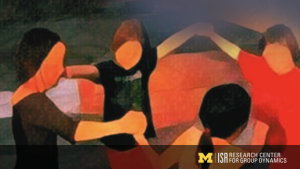Presented By: Research Center for Group Dynamics (RCGD)
RCGD Fall Seminar Series on the Science of Social Relationships: Adrienne Wood
Acquaintances and friends: Balancing social exploration and exploitation

Adrienne Wood of the University of Virginia joins the RCGD Seminar Series on the Science of Social Relationships.
Close friendships are essential for well-being and are often built on shared interests, identities, or experiences. But interacting with new and diverse social partners also offers benefits, like novelty, a sense of belonging, and future friendship. A healthy social network therefore balances social exploitation (investing in familiar relationships) and social exploration (interacting with strangers and embracing differences). In this talk, I first present survey and experience sampling data that suggests preferences for spending time with friends versus acquaintances predict distinct patterns in well-being and social network structure. Despite its benefits, social exploration comes with challenges: it can be harder to connect and or find common ground with dissimilar others. Drawing on sociocentric network data, I show that successful exploration hinges not just on who we meet, but how we perceive them: perceived similarity, more than actual similarity, predicts outcomes like belonging and even shared laughter. These findings suggest that the explore-exploit tradeoff in social life is not just about who we spend time with, but how we bridge the unfamiliar into the familiar.
About the series:
Humans are social animals and from the earliest days of life, are dependent on the quality of social relationships with significant others: family, kin, friends, and a growing social network of online acquaintances. But, how do we conduct research and come to understand the social processes transpiring in these significant social connections with others? What are the consequences for individual development and mental health outcomes of having close intimate relationships in one’s life? There is also a darker side to some relationships in the form of violence, aggression, and conflict. How do we study these processes? Social media and artificial intelligence have opened up new ways of thinking about “what is a social relationship?” and how many of these “friends” can one truly have.
The speakers for this series will focus on different types of social relationships, spanning family and parent-child relationships, friendships, peer networks, romantic relationships, attachment relationships, and the use of online media to maintain social connections. Although several speakers are senior scholars with extensive research backgrounds in the field, many are junior scholars who are traversing new paths into the science of social relationships. Please join us Mondays to learn more about the exciting field of social relationships!
These events are held Mondays from 3:30 to 5.
In person: ISR Thompson 1430, unless otherwise specified.
Organized by Brenda Volling and Richard Gonzalez.
As permissions allow, seminars are later posted to our YouTube playlist.
Close friendships are essential for well-being and are often built on shared interests, identities, or experiences. But interacting with new and diverse social partners also offers benefits, like novelty, a sense of belonging, and future friendship. A healthy social network therefore balances social exploitation (investing in familiar relationships) and social exploration (interacting with strangers and embracing differences). In this talk, I first present survey and experience sampling data that suggests preferences for spending time with friends versus acquaintances predict distinct patterns in well-being and social network structure. Despite its benefits, social exploration comes with challenges: it can be harder to connect and or find common ground with dissimilar others. Drawing on sociocentric network data, I show that successful exploration hinges not just on who we meet, but how we perceive them: perceived similarity, more than actual similarity, predicts outcomes like belonging and even shared laughter. These findings suggest that the explore-exploit tradeoff in social life is not just about who we spend time with, but how we bridge the unfamiliar into the familiar.
About the series:
Humans are social animals and from the earliest days of life, are dependent on the quality of social relationships with significant others: family, kin, friends, and a growing social network of online acquaintances. But, how do we conduct research and come to understand the social processes transpiring in these significant social connections with others? What are the consequences for individual development and mental health outcomes of having close intimate relationships in one’s life? There is also a darker side to some relationships in the form of violence, aggression, and conflict. How do we study these processes? Social media and artificial intelligence have opened up new ways of thinking about “what is a social relationship?” and how many of these “friends” can one truly have.
The speakers for this series will focus on different types of social relationships, spanning family and parent-child relationships, friendships, peer networks, romantic relationships, attachment relationships, and the use of online media to maintain social connections. Although several speakers are senior scholars with extensive research backgrounds in the field, many are junior scholars who are traversing new paths into the science of social relationships. Please join us Mondays to learn more about the exciting field of social relationships!
These events are held Mondays from 3:30 to 5.
In person: ISR Thompson 1430, unless otherwise specified.
Organized by Brenda Volling and Richard Gonzalez.
As permissions allow, seminars are later posted to our YouTube playlist.